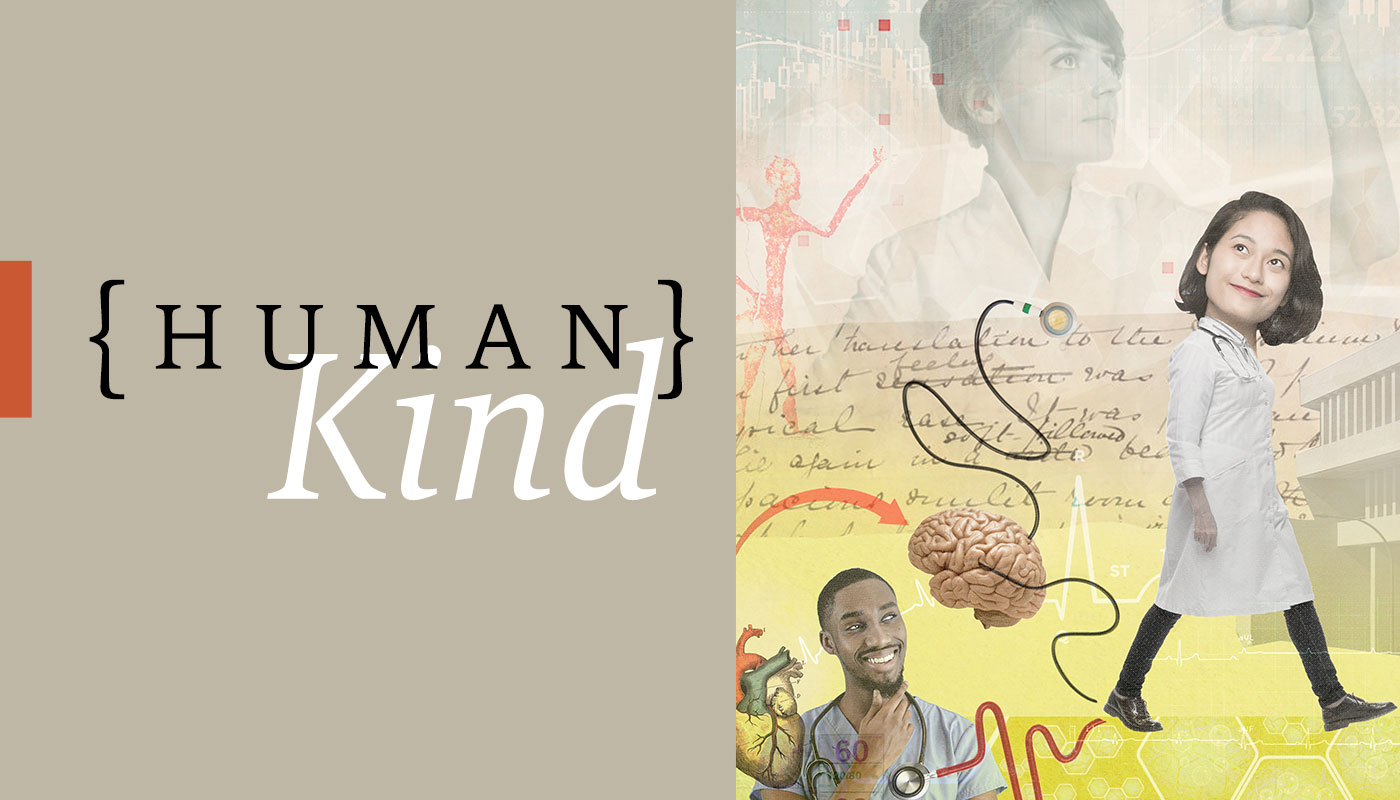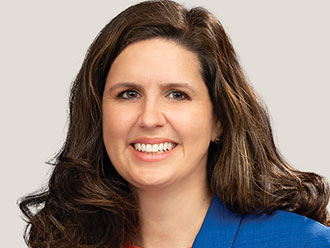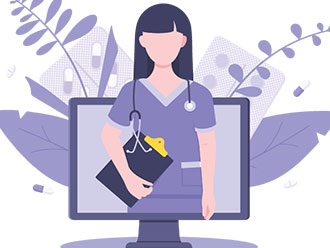JaiAnna Megahan, now a senior psychology major and pre-med student at UTA, was just 19 when she almost died. She had just begun her college experience, and it unfurled much the same way it does for other freshmen: lots of studying, making new friends, and fun. But somewhere along the way, she started to feel sick.
She found herself short of breath in the midst of mundane activities like changing her clothes or walking to class. At the same time, she started experiencing intense pain in her calves.
Her visit to the local health clinic uncovered what was a life-or-death health crisis: She had a blood clot in her leg, and at the nearby hospital, doctors discovered many more clots in her lungs. Throughout her time in the hospital as she sought and received treatment, she encountered several doctors and nurses, all of whom approached her with vastly different levels of care and concern.
“That entire week, I felt like a limited-time-only museum exhibit that everyone had a ticket to—everyone but me,” she says. “I had never felt more alone, more confused, or more frightened than I did that week in the hospital. But I lived. And not only did I live—I learned.”
The lesson, she says, is one that you can’t read in a textbook.
“When you go through school as an aspiring physician, you are taught techniques, theories, and told to see the body as a machine,” she says. “You are the mechanic looking for what caused the car to break down. But that week in the hospital allowed me to experience medicine as a patient. I was a human being with emotions and feelings that weren’t being seen. I was vulnerable.”
Now an aspiring physician, Megahan wants to create a more humane medical practice, something she acknowledges has been a hot topic for a long time in the medical field.
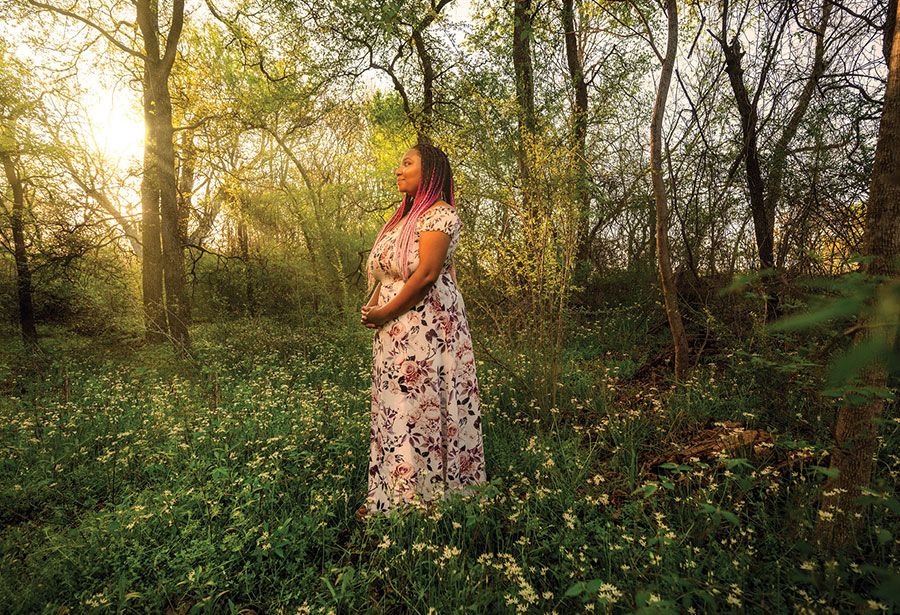
JaiAnna Megahan, a senior psychology major, became interested in medical humanities after a health scare as a freshman.
“The majority of students go into the medical field because they want to help people, but I believe that somewhere along the away, we forget how to express it,” she says. “We can only go so far with the technical information we learn in the classroom. We must learn the science, practice the compassion, and teach both.”
This humanitarian approach to the practice of medicine is the heart of the new Medical Humanities program in UTA’s College of Liberal Arts (COLA). Housed in the Department of Philosophy and Humanities, Medical Humanities is an interdisciplinary field that pulls together humanities, social sciences, and the arts with their applications to medical education and practice.
“A basic tenet of liberal arts is that they pervade everything, and that it’s a way to understand how to think,” says Dan Cavanagh, interim dean for COLA and a professor of music. “Society needs those who are able to draw in ways of thinking from seemingly disparate areas to understand problems. Medical humanities is one of those areas that really exemplifies that kind of approach.”
Those involved in UTA’s Medical Humanities program—from administrative leadership to faculty to students—believe medical humanities can transform health care for the world.
A Human Connection
At first glance, it would seem that liberal arts and medicine wouldn’t necessarily go hand in hand, but they share a key commonality: humans. That connection is exactly the point of medical humanities, which seeks to bridge the two disciplines for the benefit of the people medicine serves.
“The humanities are a way to create context around students’ scientific, pre-med, or nursing studies,” says Dr. Cavanagh. “It’s a unifying factor.”
Comprised of instructional programs that explore the ethical, historical, literary, and philosophical dimensions of medicine or health, medical humanities can include education in art, cultural studies, economics, history, literature, anthropology, religion, technology, visual art, and writing.
As reported in an extended article published by the Association of American Medical Colleges titled “The Fundamental Role of the Arts and Humanities in Medical Education,” educating the health care workforce with a dose of arts and humanities delivers outcomes that improve the patient experience and their health, and can aid in a clinician’s ability to meet 21st-century needs.
“I counsel pre-med students regularly regarding the changing characteristics for the ideal medical school applicant,” says Steven Gellman, founder of UTA’s Medical Humanities program and associate professor of practice. “Many pre-med and health professions students find value in a science major alongside a minor in medical humanities and bioethics, where we teach about hope, about pain and suffering, about empathy. These are all things that I wish I had learned when I was in medical school, but it was never taught. Somehow it’s supposed to be picked up along the way.”
Medical Humanities at UT Arlington
The first medical humanities course at UT Arlington took place in the fall of 2018. From there, it has grown to include a 12-credit-hour Medical Humanities certificate program and the new 18-credit-hour minor in Medical Humanities and Bioethics that started in August 2021. A federal grant of $35,000 was awarded to UT Arlington with funding from the National Endowment for the Humanities for the continued planning and revision of UTA’s program. The first group of student graduates with the minor completed their degrees in spring 2022.
Prishmi Nagarajan graduated in spring 2021 with a Bachelor of Science in biology and a certificate in Medical Humanities. She is currently studying for the Medical College Admission Test for prospective medical students. Nagarajan took criminology and social work classes along with biology and other medical humanities courses.
“Those were some of the coolest classes that I took in my undergraduate career,” says Nagarajan, who hopes to one day have a career in pediatrics or ophthalmology. “I remember putting together my biology degree plan and saying to myself, ‘Criminology sounds so out of the ordinary,’ and that excited me.”
In addition to requirements for the minor, like “Introduction to Medical Humanities” and biomedical ethics courses, students can take courses that allow them to explore how medicine intersects with just about any liberal arts discipline. One unique requirement of UTA’s medical humanities minor is a course in disability studies, another field that was developed through COLA. In all of these courses, students develop skills in collaboration, cultural competencies, research, and writing about health-related subjects.
“Those experiences in my classes were really enlightening. They tied together ethics, philosophy, and medicine in a cohesive way,” says Nagarajan. “It gave me a lot of different perspectives on how to help people in the best way possible. With those skills, I can trust myself to handle unexpected or difficult situations.”
Dr. Gellman, who practiced medicine for 31 years and is also a clinical assistant professor at UT Southwestern Medical Center, says that reemphasizing the importance of the person as the patient has been a chief goal.
“Patients kept coming to me over the years saying, ‘I went to that doctor and we didn’t connect’ or ‘The doctor didn’t care about me as a person,’ and that is the crux of the whole program here at UTA,” he says. “Treat the person. Students should be trained to be interested in the patient as a whole, rather than as symptoms alone—to be interested in people rather than in diseases. My goal at UTA is to transform medicine and make it more humane and more personal.”
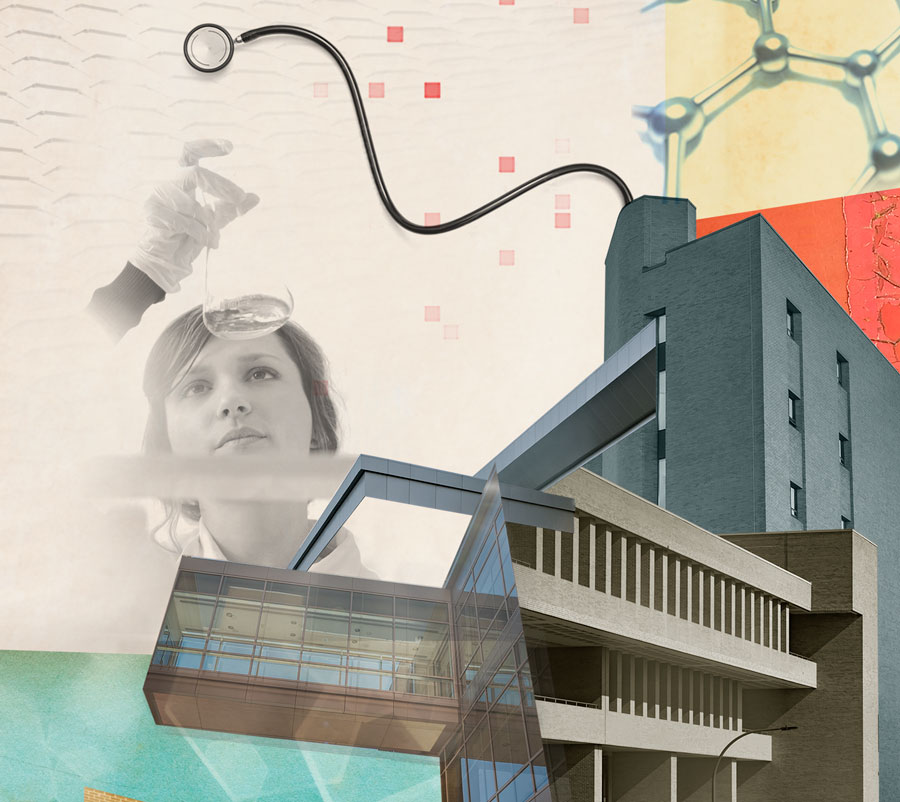
“Students should be trained to be interested in the patient as a whole, rather than as symptoms alone—to be interested in people rather than diseases.”
Passionate Students to Compassionate Professionals
Gellman considers student enthusiasm and participation the most meaningful part of medical humanities learning at UT Arlington.
The newly formed club, Mavericks for Medical Humanities, has over 40 members and regular programming, including a virtual symposium in April 2021 that brought in 130 attendees. Karyssa Nelson, who completed her Bachelor of Science in psychology and a certificate in Medical Humanities in December 2021, was the president of the club before she graduated.
“The emphasis of the club is to expand student learning about medicine and humanities,” says Nelson, who is taking a gap year before applying to medical school. “But of course, college students also like to be part of a community and have fun.”
In November 2021, the student organization hosted its first Medical Humanities Fair, which was funded in part by a grant from Humanities Texas, the state affiliate of the National Endowment for the Humanities. The event included an ex-FBI agent as a guest speaker, an improv workshop, live music, dancers, popcorn and cotton candy, and more. The showcase also allowed students to see the many fields that medical humanities can be applied to.
“The integration of fields is so valuable,” says Nelson. “You can express yourself while you’re also learning and improving academically. Every major and interest can fit in somehow.”
The organization also published the first issue of Stimulus: A Medical Humanities Journal in May 2021. The collection featured prose and visual arts from UTA students, faculty, staff, and alumni. Medical humanities students are offered other opportunities for creative expression, facilitated by an established studio space within UTA’s Philosophy and Humanities Department. Art supplies are available for students to use for free to help integrate the creative and the theoretical.
As the forward for Stimulus, co-written by founding editors Nelson and Thao Thu Nguyen (’20 BS, Biomedical Engineering), reads: “We want to highlight the importance of ethics and empathy in health care providers while simultaneously recognizing that they, just like their patients, are multifaceted. We hope to provide a space for our students and staff, many of whom are current or future health care workers, not only to keep their passions alive, but to find a way to incorporate their art into their roles as providers.”
Growing Importance
Smriti Ghimire, an undergraduate student in pre-medical studies at UTA and member of Mavericks for Medical Humanities, believes it will benefit her to broaden her viewpoint beyond a single discipline.
“You can connect anything back to medical humanities,” says Ghimire. “One of my early interests in medical humanities stemmed from its pertinence in our daily lives, especially during the pandemic.”
Indeed, the COVID-19 pandemic has been a once-in-a-century crisis that has forced health care professionals and educators to look beyond the traditional tools of contemporary medicine. Now more than ever, scientific knowledge must be woven together with emotional intelligence, critical-thinking skills, and an understanding of social context. The significance of COVID-19 has forced both health care professionals and those interested in the humanities to ask new questions. Mavericks are coming in wanting to make a difference, knowing that science and data have a life of their own.
Eli Shupe, program coordinator of medical humanities at UTA and assistant professor of philosophy and humanities, says Mavericks who take these courses and go on to become nurses or doctors will be able to think more broadly when dealing with public health catastrophes.
“It is a topical field of study, and students are particularly passionate about it right now because they’ve experienced the effects of the COVID-19 pandemic and large-scale health policy decisions,” says Dr. Shupe. “Many of them have experienced the virus firsthand or may have even lost loved ones to COVID. The students are acutely aware of the ethical dimensions of the pandemic, of health care, and of public health policy, and are connecting with the material in a way that I’ve never experienced before as a bioethics teacher.”
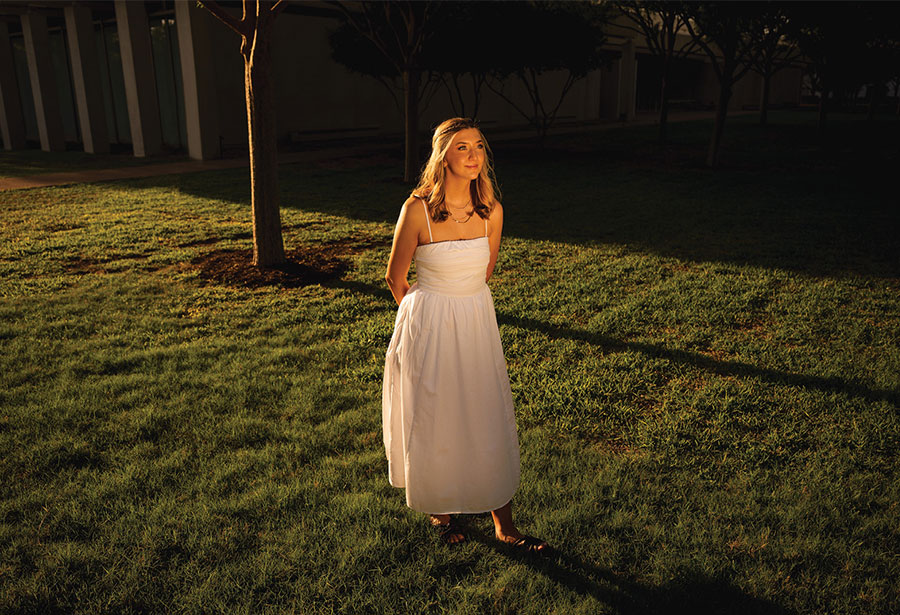
Karyssa Nelson (’21 BA, Biology) graduated with a medical humanities certificate from UTA.
The Future of Health Care
The future is wide open for Mavericks who pursue medical humanities training on their paths to becoming health care providers. The skills can translate easily into medical school, public health departments, community services, health education, or even in research laboratories. Essentially any profession that was created to help someone who is struggling can benefit from providers who have pursued medical humanities as part of their learning.
“Our liberal arts courses combined with UTA’s amazing programs across disciplines like science, nursing, kinesiology, and social work are a huge strength,” says Cavanagh. “Combining this critical mass of experts from across the colleges creates an inspiring, unique, and timely experience for our students.”
The interdisciplinary connections between campus units are able to bring students who wouldn’t typically be in liberal arts classes into arts and humanities classrooms. As the Medical Humanities program grows, UTA administrators aim to grow its value for pre-health professionals and students in other fields alike.
“We hear from colleagues across the medical field how important the skills that they learn here can be,” says Cavanagh. “That human compassion and understanding how things like the arts can play a role in a physician’s or a dentist’s or a nurse’s professional life—it’s not just for the benefit of their work treating patients, but also for their own lives.” uta
